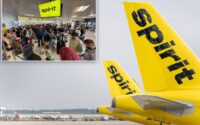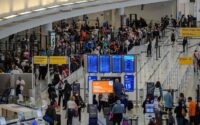What I really miss now is the hidden magic of business travel
Is business travel dead? Border closures and domestic quarantines have caused tens of millions of American to miss their vacations, and we are all supposed to be lamenting that trip to the beach or to Vietnam. Instead, after six months of being grounded, I miss boring trips: one- or two-night hops to mid-sized American cities and small towns for work.
Domestic business trips aren’t supposed to be fun, and for the most part, they aren’t. The reward for waking up at 4 a.m. to take the train to the bus to LaGuardia is to board a little plane and be stuck next to a strange, tall man in economy class on a short flight with no food.
After performing a series of chores during the day, you then retire to the off-brand Marriott at 6 p.m., do nothing for four hours and sleep fitfully in a loud, cold room. The next night, having completed a second set of chores, you reboard the plane to hear the pilot say, “It’s going to be bumpy tonight, but we’ll fly straight through it to get you home fast.”
Yet over more than a decade of five or six such modest trips a year, it turns out I have seen the country through business trips, not vacations.
I would never go to Southern California voluntarily. But one of my favorite memories is of giving a speech to a small crowd on the patio of a house high in the Hollywood Hills, feeling the evening breeze on my neck and looking down at the chaotic city below. I kind of got it: why people like living in LA (or, at least, why rich people like living in LA).
Similarly, I would never think of taking a vacation in the middle of Arizona. But the landscape and the quality of the air were so alien that they have stayed with me more than a decade later.
So has the experience of opening the sliding door before bed — heeding the printed warnings to disturb neither the rattlesnakes nor the border-crossing migrants — and looking outside at absolutely nothing for miles but desert darkness.
Nashville, Kansas City, Chicago, San Diego, Houston, Philadelphia, Indianapolis, Washington — I think just as fondly about walking their downtowns and stealing an hour to visit one of their museums or parks as I do about the most carefully planned leisure getaway.
Locked down, I reminisced just as much about eating by myself in the bar in downtown Detroit for four days in a row, becoming a “regular,” as about going to the Louvre.
Dinner in the historic lobby of Chicago’s Palmer House, with a book for a companion, watching everyone check in and out of the oldest hotel in the United States, is a treat — especially if someone else is paying. But now, thanks to COVID-19, the Palmer House is in default on its mortgage.
Sure, we can Zoom — but Zooming doesn’t get you a long car ride through West Virginia’s mountains, or a walk under the live oaks in Baton Rouge, or a visit to a western Kentucky farmers’ market.
Nothing beats the irony of trying, and failing, to take the public bus to the Ford car museum in Dearborn, Mich., and then taking Ford’s private bus between the auto museum and the pickup-truck factory tour, as it’s the most efficient way to move a group of people from one place to another.
A criticism of business travel is that it is sanitized. What’s the difference between a hotel room in Chicago and a hotel room in Lake Charles, La.?
But America remains unhomogenized. Which urban Whole Foods think it’s necessary to station guards outside their stores, and which don’t? The Woodlands, Texas, home of ExxonMobil, is walkable. San Francisco isn’t.
Last year, after a day in Detroit, I took the public (Canadian) bus through the Windsor Tunnel to Canada. At the time, after a few minutes, it seemed clear that this was a dumb idea. There was nothing to do in Canada — sorry, Canada — but walk around for an hour or so through a half-empty casino district, some drugstores aimed at the American market and a small park with a box to deposit heroin needles.
I wouldn’t have predicted that a year later, with the border now closed, what seemed like a waste of time and bus fare would have become, in retrospect, a now-forbidden, exotic adventure.
Nicole Gelinas is a contributing editor of City Journal.
Twitter: @NicoleGelinas


